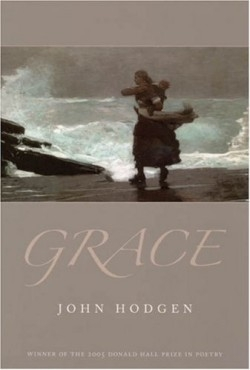Grace
In a world saturated with mass-produced glossy images designed to catch one’s attention, the artist, of all creators, has an obligation to present his vision with a particularly lucid authority. John Hodgen’s poems countermand the dictates of mass culture that impress upon readers images of airbrushed and Photoshopped perfection. Hodgen’s assembled images of the common aspects of life—dust, rusty tin roofs, the crescent moon, his neighbor walking in her yard “like Emily Dickinson / alone in the world,” reflect the sublime sense of grace one can attain by paying close attention to the most familiar things: “a slender roan horse feeds under its basilica of broken branches / because he knows that is the place / where the soft tufts of grass / taste the sweetest.”
Grace, the winner of the 2005 Donald Hall Prize in Poetry, awarded by the Association of Writers and Writing Programs, celebrates the world at one’s doorstep: “Christmas coming on, and down Mt. Auburn Street they come, hells bells, the hustlers, / bustlers, errant lovers, shopping bags in tow, a woman in a full-length gray parka and a tam, / a jogger, nonplussed, in red shorts, a harried businessman, sputtering, howling.” The poems stride deliberately through the American vein, moving from elegiac lyrical laments about family, to long-lined riffs springing from the jazz of happenstance.
“This Moon, These Fifty Years” is a traditional reflection, the poet’s memory of his father: “He’d come home from his job at the paper mill / second shift, three to eleven.” With the familiar mix of particulars—Buicks, Camels, Sputnik—the poem ends with the concern of American poets who are crying out, I am here, I am here, I am here. In contrast to the personal material of many of the poems, a piece such as “High Summer,” a cinemagraphic observation of Whitman nursing wounded soldiers at the conclusion of the Civil War, develops historical themes.
Hodgen, adjunct professor of English and Creative Writing at Assumption College and Mount Waschusett Community College, is the winner of the 1993 Bluestem Award, the Balcones Poetry Prize, the 2005 Ruth Stone Poetry Prize, and the Grolier Prize, as well as others. The poems in Grace reveal Hodgen’s grounding in the American poetic tradition with the many echoes and references to Whitman, Dickinson, Norman Dubie, James Wright, Elizabeth Bishop, and Allen Ginsberg. Hodgen’s poems present the often-overlooked commonplace world and ask the reader to accept the presence of grace in the most mundane moments: “I am saying we could have smiled is all, at the van that wouldn’t go, / at the world conjoined, at the calcified rainbows in the oil stains / outside the Coolawhatchie Blimpie GasnGo.”
Reviewed by
Duncan Sprattmoran
Disclosure: This article is not an endorsement, but a review. The publisher of this book provided free copies of the book to have their book reviewed by a professional reviewer. No fee was paid by the publisher for this review. Foreword Reviews only recommends books that we love. Foreword Magazine, Inc. is disclosing this in accordance with the Federal Trade Commission’s 16 CFR, Part 255.

